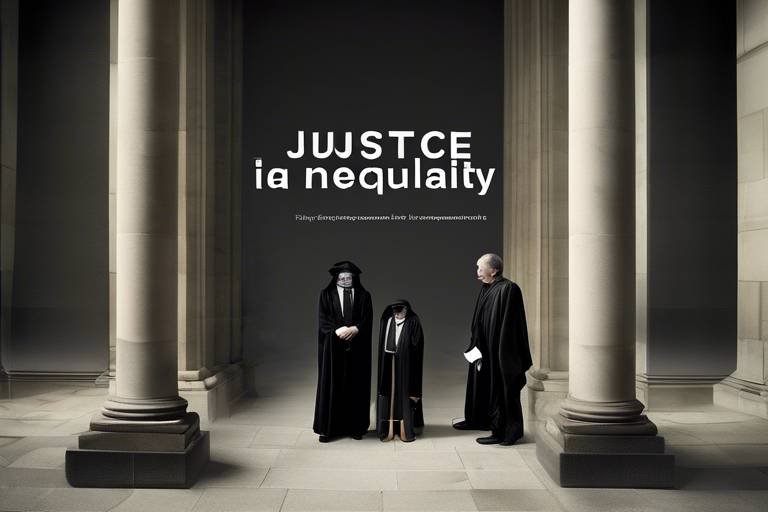Is Happiness the Ultimate Philosophical Goal?
When we think about life’s ultimate purpose, many of us find ourselves pondering the question: is happiness the ultimate philosophical goal? This inquiry has captivated thinkers for centuries, inviting us to explore not just the essence of happiness, but also its implications for our lives and society. Imagine happiness as a shimmering beacon on a distant shore, guiding our ships through the turbulent waters of existence. But what does it truly mean to be happy, and is this pursuit worth all the effort we put into it?
At the heart of this debate lies a fundamental truth: the quest for happiness is deeply personal and often subjective. For some, happiness may be found in the simple joys of life—a warm cup of coffee on a chilly morning, the laughter of loved ones, or the satisfaction of a job well done. For others, it might be tied to grander achievements, such as career success or contributing to the welfare of others. This diversity in understanding happiness reflects the rich tapestry of human experience, shaped by culture, values, and personal circumstances.
Philosophers have long grappled with the meaning of happiness, providing us with a wealth of perspectives. From the ancient wisdom of Aristotle, who emphasized living a virtuous life, to the hedonistic views of Epicurus, who argued that pleasure is the key to happiness, the conversation has evolved. In modern times, thinkers continue to dissect happiness, examining its role in ethics and personal development. As we navigate this philosophical landscape, it becomes clear that happiness is not merely an endpoint but a journey filled with twists and turns.
Moreover, the implications of pursuing happiness extend beyond the individual. In a society that often equates success with material wealth, the relentless chase for happiness can lead to a paradox. We find ourselves caught in a cycle where the more we seek happiness through external means, the more elusive it becomes. This raises critical questions: Are we sacrificing our well-being for the sake of societal approval? Is our definition of happiness too narrow, limiting our ability to experience true fulfillment?
As we delve deeper into this philosophical inquiry, we must also consider the challenges that accompany the pursuit of happiness. Societal pressures often dictate what happiness should look like, leading to unrealistic expectations that can cloud our judgment and hinder personal satisfaction. Additionally, psychological barriers, such as anxiety and depression, can create significant obstacles in our quest for happiness. Understanding these challenges is essential, as it allows us to approach happiness with a more nuanced perspective.
In conclusion, the question of whether happiness is the ultimate philosophical goal is not one with a straightforward answer. It is a complex interplay of personal values, societal influences, and philosophical insights. As we reflect on our own lives, let us remember that happiness is a journey rather than a destination. By embracing the multifaceted nature of happiness, we can cultivate a deeper understanding of what it means to live a fulfilling life.
- What is the philosophical definition of happiness? Happiness is often defined as a state of well-being and contentment, varying across cultures and philosophies.
- How do historical perspectives influence our understanding of happiness? Historical philosophers like Aristotle and Epicurus have shaped contemporary views on happiness, emphasizing virtue and pleasure, respectively.
- Can societal pressures impact our pursuit of happiness? Yes, societal norms can create unrealistic expectations, making it difficult to achieve personal satisfaction.
- What role do psychological barriers play in experiencing happiness? Mental health issues can significantly impede one's ability to experience happiness, making it essential to address these barriers for genuine well-being.

The Definition of Happiness
Understanding what happiness truly means is crucial in this philosophical discussion. It's not just a fleeting emotion or a moment of joy; happiness is often seen as a deeper state of being, intertwined with our values, beliefs, and even our cultural backgrounds. Different cultures and philosophies offer varied definitions, influencing how happiness is perceived and pursued. For instance, in Western cultures, happiness is frequently associated with individual success and material wealth, while many Eastern philosophies emphasize harmony with others and the universe as essential components of a happy life.
To delve deeper into this concept, let's consider some of the common definitions of happiness:
- Hedonic Happiness: This perspective views happiness as the presence of pleasure and the absence of pain. It’s about enjoying life’s pleasures, whether they are physical, emotional, or intellectual.
- Eudaimonic Happiness: Rooted in Aristotelian philosophy, this definition emphasizes living in accordance with one’s true self and fulfilling one's potential. It’s about purpose and meaning in life.
- Subjective Well-Being: This contemporary psychological term refers to how individuals experience the quality of their lives and includes both emotional reactions and cognitive judgments.
These varying definitions highlight how subjective happiness can be. What makes one person happy might not resonate with another. This subjectivity raises an intriguing question: can happiness be universally defined, or is it a personal journey that each individual must navigate? The answer likely lies somewhere in between. While there are common threads—such as the desire for connection, purpose, and fulfillment—each person's path to happiness is unique, shaped by their experiences, culture, and personal aspirations.
Moreover, understanding happiness also involves recognizing its transient nature. Just like the weather, happiness can be influenced by external factors such as relationships, job satisfaction, and even societal conditions. This fluidity invites us to consider how we can cultivate happiness in our lives despite these fluctuations. It encourages a proactive approach, where we actively seek out experiences and relationships that enrich our lives rather than passively waiting for happiness to come our way.
In conclusion, defining happiness is more than just a philosophical exercise; it is a vital part of our human experience. By exploring the various interpretations of happiness, we can better understand our own desires and aspirations. This understanding can lead us to a more fulfilling and meaningful life, where happiness is not merely a goal but a journey.

Historical Perspectives on Happiness
Throughout the ages, the quest for happiness has captivated the minds of some of the greatest philosophers. Each era brought forth unique interpretations and frameworks that shaped our understanding of what it means to be truly happy. From the ancient Greeks to modern thinkers, the perspectives on happiness have evolved, but the core questions remain strikingly similar: What is happiness? How do we achieve it? And is it the ultimate goal of life?
One of the most influential figures in the discourse on happiness was Aristotle, who lived in ancient Greece. He introduced the concept of eudaimonia, which is often translated as "flourishing" or "living well." For Aristotle, happiness was not merely a fleeting emotion or a state of pleasure; instead, it represented the highest good and the ultimate end of human existence. He believed that achieving eudaimonia required living virtuously and realizing one's potential through the practice of moral and intellectual virtues. In Aristotle's view, happiness was a byproduct of a life well-lived, characterized by reason and ethical behavior.
In contrast, the philosopher Epicurus took a different approach. He argued that happiness is rooted in the pursuit of pleasure and the avoidance of pain. Epicurus emphasized the importance of simple pleasures and the cultivation of friendships, suggesting that true happiness comes from a balanced life that prioritizes mental tranquility over excessive indulgence. His hedonistic philosophy invites a fascinating debate about the nature of pleasure: Is it about immediate gratification, or does it involve a deeper, more sustained sense of fulfillment?
These historical philosophies set the stage for contemporary discussions on happiness. As we delve deeper into the 20th and 21st centuries, we see that the conversation has expanded to include various cultural and social dimensions. Philosophers such as John Stuart Mill have further developed the idea of happiness within the framework of utilitarianism, suggesting that actions should be evaluated based on their consequences for the greatest happiness of the greatest number. This perspective raises important questions about the balance between individual desires and collective well-being.
Moreover, the existentialist movement, led by thinkers like Jean-Paul Sartre and Simone de Beauvoir, challenges the conventional views of happiness by emphasizing personal authenticity and self-discovery. They argue that true happiness cannot be found in societal expectations or material success but rather in embracing one's freedom and individuality. This existential perspective resonates with many in today's world, where the pressure to conform can often overshadow personal fulfillment.
In summary, the historical perspectives on happiness offer a rich tapestry of ideas that continue to influence our understanding of this complex emotion. From Aristotle's virtue ethics to Epicurus's hedonism, and from utilitarianism to existentialism, each philosophical approach provides valuable insights into the nature of happiness and its role in our lives. As we navigate the intricate landscape of happiness, it becomes clear that the journey is as significant as the destination. Understanding these historical contexts not only enriches our philosophical discussions but also helps us reflect on our personal pursuits of happiness in an ever-changing world.
- What is eudaimonia? Eudaimonia is a Greek term often translated as "flourishing" or "living well," introduced by Aristotle as the ultimate goal of human life, achieved through virtuous living.
- How does Epicurus define happiness? Epicurus defines happiness as the pursuit of pleasure and the avoidance of pain, emphasizing the importance of simple pleasures and mental tranquility.
- What is the role of utilitarianism in the discussion of happiness? Utilitarianism posits that the best actions maximize happiness for the greatest number, raising questions about the balance between individual and collective happiness.
- How do existentialists view happiness? Existentialists believe that true happiness comes from personal authenticity and self-discovery, challenging societal expectations and material success.

Aristotle's Concept of Eudaimonia
When we dive into the rich pool of Aristotle's philosophy, one concept that stands out is eudaimonia, a term often translated as "flourishing" or "well-being." But what does it really mean? For Aristotle, happiness isn't just a fleeting emotion or a moment of joy; it's about living a life of virtue and fulfilling one's potential. Imagine happiness as a garden; it requires nurturing, care, and the right conditions to thrive. In this view, happiness is not merely the absence of pain or suffering but the presence of a meaningful and purposeful life.
Aristotle believed that achieving eudaimonia involves virtue—the idea that one must cultivate moral and intellectual strengths to lead a fulfilling life. This means that happiness is not something that can be handed to you on a silver platter; it’s something you actively work towards through your actions and choices. He emphasized the importance of finding a balance, often referred to as the "Golden Mean." This is where one avoids extremes and instead finds a moderate path that leads to a harmonious existence. For example, courage lies between recklessness and cowardice, just as generosity lies between prodigality and stinginess.
To further illustrate Aristotle's perspective, consider the following table that outlines the key components of eudaimonia:
| Component | Description |
|---|---|
| Virtue | The moral qualities that enable individuals to live well. |
| Reason | The ability to think critically and make wise decisions. |
| Community | Engagement with others to foster relationships and support. |
| Self-Actualization | Realizing one's potential and pursuing personal growth. |
In essence, Aristotle’s vision of happiness is holistic. It’s about developing the whole person—mind, body, and spirit. He argued that true happiness is an activity of the soul in accordance with virtue, which means that it is not a passive state but an active pursuit. So, what does this mean for us today? It challenges the common notion that happiness can be found in external achievements or material possessions. Instead, it invites us to reflect on our values, our actions, and our relationships.
Ultimately, Aristotle's eudaimonia teaches us that happiness is not a destination but a journey. It’s about engaging with life fully and authentically. So, the next time you find yourself chasing after fleeting moments of joy, remember Aristotle’s wisdom; perhaps it’s time to cultivate your garden of happiness through virtue, reason, and meaningful connections.

Epicurean Views on Pleasure
Epicurus, the ancient Greek philosopher, had a rather intriguing take on happiness, which he closely tied to the concept of pleasure. But before you start picturing wild parties and indulgent feasts, let’s clarify what he truly meant. For Epicurus, pleasure wasn't just about hedonistic excess; it was a more nuanced understanding of what it means to live well. He believed that the pursuit of pleasure is essential for achieving happiness, but he also emphasized the importance of moderation and wisdom in this pursuit.
Epicurus categorized pleasures into two main types: kinetic pleasures and static pleasures. Kinetic pleasures are those that arise from active engagement, such as eating a delicious meal or enjoying a thrilling adventure. These are the fleeting moments that bring immediate joy but can often lead to overindulgence. On the other hand, static pleasures are more about the absence of pain and the cultivation of tranquility. Imagine sitting in a serene garden, feeling at peace with yourself—that's the essence of static pleasure.
To illustrate this, let's consider a simple
| Type of Pleasure | Description | Examples |
|---|---|---|
| Kinetic Pleasures | Active engagement that provides immediate joy | Eating, traveling, socializing |
| Static Pleasures | Absence of pain and cultivation of tranquility | Relaxing in nature, meditation, contentment |
Epicurus also argued that not all pleasures are equal. He believed in prioritizing those that lead to long-term happiness over those that offer only short-lived satisfaction. This perspective invites a deeper reflection on our choices and encourages us to seek out pleasures that contribute to our overall well-being. For instance, while indulging in dessert might bring a moment of joy, consistently overindulging could lead to health issues, which ultimately detracts from happiness.
Moreover, Epicurus emphasized the importance of friendship and community in the pursuit of pleasure. He argued that the bonds we form with others can significantly enhance our happiness. After all, sharing experiences and joys with friends can amplify those moments, creating a richer tapestry of life. Think about it: isn't a good laugh with friends more satisfying than a solitary indulgence?
In summary, Epicurean philosophy teaches us that happiness is intricately linked with pleasure, but it also calls for wisdom in how we pursue it. The balance between kinetic and static pleasures, the prioritization of meaningful experiences, and the cultivation of relationships are all vital components of a fulfilling life. So, the next time you chase after happiness, consider what kind of pleasures you're pursuing and how they align with your long-term well-being.
- What is the main idea behind Epicureanism? Epicureanism emphasizes the pursuit of pleasure and the avoidance of pain, advocating for a balanced approach to achieving happiness.
- How do kinetic and static pleasures differ? Kinetic pleasures are active and immediate, while static pleasures focus on tranquility and the absence of pain.
- Can friendships enhance happiness according to Epicurean philosophy? Yes, Epicurus believed that friendships significantly contribute to happiness by enhancing shared experiences and joy.

Modern Philosophical Views
In today's world, the quest for happiness is more relevant than ever, and modern philosophical views have evolved to reflect this urgency. Philosophers from various disciplines are engaging with the concept of happiness, exploring its implications not only for individual well-being but also for societal structures. One of the most significant shifts in contemporary thought is the recognition that happiness is not a one-size-fits-all experience; rather, it is multifaceted and influenced by a myriad of factors including culture, personal values, and life circumstances.
One prominent school of thought is Utilitarianism, which posits that the moral worth of an action is determined by its contribution to overall happiness. This perspective, championed by philosophers like Jeremy Bentham and John Stuart Mill, suggests that actions should be evaluated based on their consequences for the greatest number of people. However, this raises a complex question: can the happiness of the majority justify the suffering of a minority? This dilemma illustrates the tension between individual rights and collective well-being, prompting deeper discussions about the ethical implications of happiness in societal decision-making.
On the flip side, we have Existentialism, which offers a more individualized approach to happiness. Existentialist thinkers like Jean-Paul Sartre and Simone de Beauvoir argue that true happiness stems from personal authenticity and self-discovery. In their view, happiness is not simply about achieving societal standards or material success; it is about embracing one's freedom to create meaning in life. This perspective challenges conventional definitions of happiness, suggesting that it is a deeply personal journey rather than a universal destination.
Moreover, the interplay between happiness and ethical behavior has become a crucial topic in modern philosophy. Many theorists argue that ethical actions lead to a more profound sense of happiness, creating a virtuous cycle. For instance, altruistic behavior not only benefits others but can also enhance one's own sense of fulfillment. This correlation prompts us to consider: is happiness a byproduct of ethical living, or is it a prerequisite for making ethical decisions?
In summary, the modern philosophical landscape presents a rich tapestry of ideas surrounding happiness. From the collective focus of Utilitarianism to the individualistic lens of Existentialism, these perspectives encourage us to reflect on our own definitions and pursuits of happiness. As we navigate our lives, it is essential to recognize that happiness is not merely an end goal but a dynamic process shaped by our choices, values, and interactions with others.
- What is the main difference between Utilitarianism and Existentialism in terms of happiness?
Utilitarianism focuses on maximizing happiness for the greatest number, while Existentialism emphasizes personal authenticity and self-discovery as the path to true happiness. - Can happiness be measured?
While some argue that happiness can be quantified through metrics such as life satisfaction surveys, others believe it is a subjective experience that cannot be accurately measured. - How can ethical behavior influence happiness?
Engaging in ethical actions can lead to a deeper sense of fulfillment and happiness, as it often fosters positive relationships and contributes to a sense of community.

Utilitarianism and Happiness
Utilitarianism is a philosophical doctrine that has stirred much debate regarding the relationship between happiness and morality. At its core, this theory posits that the best action is the one that maximizes happiness for the greatest number of people. But what does this really mean for individuals and society as a whole? It's a bit like trying to find the perfect recipe for a cake that everyone will love—too much of one ingredient can spoil the mix, just as focusing solely on collective happiness can sometimes lead to the neglect of individual needs.
Imagine a bustling city where the government decides to build a new park. From a utilitarian perspective, this action could be seen as a net gain in happiness because it provides a space for recreation and relaxation for many. However, if the park is built at the expense of a local community center that serves a smaller group, we must ask whether the happiness gained by the larger population outweighs the loss experienced by the community. This dilemma illustrates the complexities of utilitarianism, particularly when it comes to balancing individual and collective happiness.
Utilitarianism also raises important questions about the moral implications of our actions. For instance, if a decision benefits the majority but harms a minority, is it still the right choice? This quandary leads us to consider the potential consequences of our actions and the ethical frameworks we use to justify them. In essence, utilitarianism challenges us to think critically about how we define happiness and the lengths we are willing to go to achieve it.
Moreover, the utilitarian approach often requires a calculation of happiness, which can be subjective and difficult to quantify. To navigate this complexity, some utilitarians propose a more nuanced understanding of happiness, taking into account qualitative differences in pleasure and satisfaction. For example, the joy derived from meaningful relationships might be valued more highly than fleeting pleasures, such as indulging in a lavish meal. This perspective invites a broader discussion about the types of happiness we pursue and the ethical considerations behind our choices.
In summary, while utilitarianism provides a compelling framework for understanding happiness, it also challenges us to confront the moral implications of our decisions. As we strive for happiness, both individually and collectively, we must consider the balance between the two and recognize that sometimes, the pursuit of happiness is not as straightforward as it seems. It's a philosophical journey that invites us to reflect on our values, our actions, and the kind of world we want to create.
- What is the main principle of utilitarianism?
Utilitarianism is based on the principle that the best action is the one that maximizes happiness for the greatest number of people. - How does utilitarianism define happiness?
Happiness in utilitarianism is often defined as pleasure or the absence of pain, but it can also include qualitative differences in experiences. - What are some criticisms of utilitarianism?
Critics argue that utilitarianism can justify harmful actions against minorities if it benefits the majority, and that it oversimplifies complex moral decisions. - Can utilitarianism apply to personal decisions?
Yes, individuals can use utilitarian principles to guide their personal choices, weighing the potential happiness or suffering their actions may cause.

Existentialism and Authentic Happiness
Existentialism, a philosophical movement that emerged in the 20th century, places a strong emphasis on individual freedom, choice, and the quest for meaning. Unlike traditional philosophies that often define happiness in terms of external achievements or societal norms, existentialists argue that authentic happiness is deeply rooted in personal authenticity and self-discovery. This perspective invites us to ask: what does it truly mean to be happy? Is it merely the absence of suffering, or is it something more profound?
At the heart of existentialism is the belief that happiness cannot be dictated by external standards or expectations. Think of it this way: if happiness were a recipe, existentialists would argue that each person must create their own unique dish, tailored to their tastes and experiences. This notion challenges the conventional idea that happiness is a one-size-fits-all concept, often defined by societal milestones such as career success, financial stability, or even romantic relationships.
Existential thinkers like Jean-Paul Sartre and Simone de Beauvoir emphasized the importance of embracing one’s freedom and taking responsibility for one’s choices. They believed that authentic happiness arises when individuals confront their own existence and make conscious decisions that align with their true selves. In this regard, happiness becomes a byproduct of living authentically rather than a goal in itself. To illustrate:
- **Sartre’s notion of “bad faith”**: This concept refers to the self-deception that occurs when individuals conform to societal expectations instead of pursuing their own desires. By breaking free from “bad faith,” one can discover genuine happiness.
- **The importance of personal choice**: Existentialists argue that every choice contributes to one’s identity. Embracing this idea can lead to a more fulfilling and authentic life.
Moreover, existentialism encourages individuals to embrace the inherent uncertainties of life. Instead of seeking happiness through rigid plans or guarantees, existentialists suggest that we should find joy in the journey of self-exploration and the acceptance of life’s unpredictability. This acceptance can be liberating, allowing us to appreciate the small moments of joy that often go unnoticed in the hustle and bustle of daily life.
However, pursuing authentic happiness is not without its challenges. The quest for self-discovery can be daunting, often requiring individuals to confront uncomfortable truths about themselves. It’s similar to peeling an onion—each layer reveals something deeper, but it can also bring tears. Yet, existentialists argue that this discomfort is a necessary part of the journey towards genuine fulfillment.
In conclusion, existentialism redefines happiness as a personal and subjective experience, urging individuals to seek authenticity and self-fulfillment. By embracing our freedom and making choices that resonate with our true selves, we can cultivate a sense of happiness that is not only profound but also deeply satisfying. So, the next time you ponder happiness, ask yourself: are you chasing someone else’s definition, or are you creating your own?
- What is existentialism? Existentialism is a philosophical movement that focuses on individual freedom, choice, and the search for meaning in life.
- How does existentialism define happiness? Existentialism defines happiness as authentic and personal, emphasizing self-discovery and living in accordance with one’s true self.
- Who are some key existentialist philosophers? Notable existentialist philosophers include Jean-Paul Sartre, Simone de Beauvoir, and Friedrich Nietzsche.
- Can happiness be achieved without external validation? Yes, existentialism suggests that true happiness comes from within and is not dependent on societal approval or external achievements.

The Role of Happiness in Ethics
Happiness is not just a fleeting emotion; it plays a profound role in ethics and moral philosophy. At its core, ethics is about making choices that lead to the well-being of individuals and society. The connection between happiness and ethics raises intriguing questions: Should our actions aim to maximize happiness? How do we define happiness in ethical terms? These questions have sparked debates among philosophers for centuries, leading to various interpretations of what it means to live a good life.
One of the most significant frameworks that intertwine happiness and ethics is **utilitarianism**. This ethical theory, championed by philosophers like Jeremy Bentham and John Stuart Mill, posits that the best actions are those that produce the greatest happiness for the greatest number of people. In this view, happiness becomes a measurable quantity, and ethical decisions are evaluated based on their outcomes. However, this raises ethical dilemmas: what happens when the happiness of the majority comes at the expense of a minority? This tension highlights the complexities of defining happiness in a way that is fair and just.
On the other hand, **deontological ethics**, as proposed by Immanuel Kant, suggests that the morality of an action is not solely determined by its consequences but rather by whether it adheres to a set of rules or duties. Kant argued that true happiness cannot be the sole aim of ethical behavior; instead, actions must be guided by principles that respect the dignity of all individuals. In this framework, happiness is an important consideration, but it is not the ultimate goal. This perspective challenges us to think about the ethical implications of our pursuit of happiness: are we sacrificing our moral obligations in the name of personal or collective gratification?
Moreover, the **virtue ethics** approach, rooted in Aristotelian philosophy, emphasizes the importance of character and virtue in achieving happiness. Aristotle believed that happiness (or eudaimonia) is attained through practicing virtues such as courage, temperance, and justice. This suggests that ethical living and personal fulfillment are deeply interconnected. In essence, the pursuit of happiness is not merely about seeking pleasure but about cultivating a virtuous character that contributes to both individual and communal well-being.
In addition to these philosophical perspectives, modern discussions about happiness in ethics also consider the role of **emotional intelligence** and **compassion**. Understanding our own emotions and those of others can lead to more ethical decision-making. When we are in tune with our feelings and the feelings of those around us, we are better equipped to make choices that promote happiness for ourselves and others. This creates a ripple effect, fostering a society where ethical behavior is aligned with the pursuit of happiness.
In conclusion, happiness is a multifaceted concept that plays a critical role in ethical discussions. Whether viewed through the lens of utilitarianism, deontological ethics, or virtue ethics, it becomes clear that our understanding of happiness influences our moral judgments and actions. As we navigate the complexities of ethical decision-making, it is essential to consider how our pursuit of happiness aligns with our responsibilities to others and to society as a whole.
- What is the relationship between happiness and ethics?
Happiness influences ethical decision-making by providing a framework for evaluating the consequences of actions, guiding moral choices towards the well-being of individuals and society. - How do different ethical theories view happiness?
Utilitarianism sees happiness as the primary goal, deontological ethics emphasizes duty over outcomes, and virtue ethics focuses on character development as a pathway to happiness. - Can pursuing happiness lead to ethical dilemmas?
Yes, the pursuit of happiness can create conflicts, especially when the happiness of the majority conflicts with the rights and happiness of the minority.

Challenges in Pursuing Happiness
Despite the universal desire for happiness, the journey toward achieving it is often riddled with challenges that can leave us feeling frustrated and disillusioned. One of the primary obstacles is the overwhelming influence of societal pressures and expectations. From a young age, we are bombarded with messages about what happiness should look like—whether it's owning the latest gadgets, achieving a certain career status, or maintaining a picture-perfect family. These societal norms can create a distorted view of happiness, leading many to chase after superficial goals that ultimately do not fulfill them. It’s like trying to catch smoke with your bare hands; the more you reach for it, the more it eludes you.
Another significant challenge lies in the realm of psychological barriers. Mental health issues such as anxiety and depression can act as formidable roadblocks on the path to happiness. When our minds are clouded with negative thoughts or feelings of inadequacy, it becomes increasingly difficult to recognize and appreciate the moments of joy in our lives. For instance, someone grappling with anxiety might find it hard to enjoy a sunny day at the park, as their mind is preoccupied with worries and what-ifs. Addressing these mental health challenges is crucial, as it not only helps in fostering genuine well-being but also allows individuals to cultivate a more authentic sense of happiness.
Furthermore, the pursuit of happiness can sometimes feel like a never-ending race. In our fast-paced world, the constant drive to achieve more—be it in our careers, relationships, or personal growth—can lead to burnout and dissatisfaction. We often fall into the trap of believing that happiness is a destination, a state we can arrive at if we just work hard enough. However, this mindset can lead to a cycle of perpetual striving, where we overlook the small joys that exist in our daily lives. To illustrate this, consider the following table that highlights the difference between the pursuit of happiness and the experience of happiness:
| Pursuit of Happiness | Experience of Happiness |
|---|---|
| Focused on future goals | Grounded in present moments |
| Often leads to stress | Promotes relaxation and contentment |
| Can feel like a competition | Encourages personal reflection |
| Requires external validation | Is rooted in self-acceptance |
In summary, the challenges in pursuing happiness are multifaceted and deeply intertwined with both societal influences and individual psychological states. Recognizing these challenges is the first step toward overcoming them. By shifting our focus from external expectations and societal pressures to internal fulfillment and self-acceptance, we can begin to navigate the complexities of happiness more effectively. After all, happiness is not just a goal; it's a journey that requires patience, understanding, and a willingness to embrace the present moment.
- What are some common misconceptions about happiness?
Many believe that happiness is solely linked to external achievements, such as wealth or success, rather than internal fulfillment and self-acceptance.
- Can happiness be measured?
While happiness can be assessed through various surveys and scales, it is ultimately a subjective experience that varies from person to person.
- How can I improve my happiness?
Improving happiness often involves fostering meaningful relationships, practicing mindfulness, and setting realistic goals that align with your values.

Societal Pressures and Expectations
In our quest for happiness, we often find ourselves navigating a complex maze of societal pressures and expectations. These pressures can manifest in various forms, from the relentless pursuit of career success to the idealized images of family life portrayed in media. It’s almost as if society hands us a script, dictating how our lives should unfold and what milestones we should achieve by specific ages. But have you ever stopped to think about how these societal norms shape our understanding of happiness?
For many, the idea of happiness is heavily influenced by cultural standards that dictate what it means to "succeed." Consider this: we are bombarded with messages suggesting that happiness is closely tied to wealth, status, and material possessions. Social media amplifies this phenomenon, showcasing curated lives that seem perfect on the surface. Yet, this creates a paradox—while we strive to meet these expectations, we may actually find ourselves feeling more isolated and unsatisfied. Isn’t it ironic that in our pursuit of happiness, we often end up feeling pressured and overwhelmed?
Furthermore, the expectations surrounding happiness can lead to a cycle of comparison. When we see friends or acquaintances achieving what society deems as success, it’s easy to fall into the trap of feeling inadequate. This can lead to a detrimental mindset where our self-worth is tied to external validation rather than internal fulfillment. To illustrate this point, consider the following:
| Expectation | Reality |
|---|---|
| Own a house by age 30 | Many are still renting or living with family |
| Have a stable job with a six-figure salary | Job security is increasingly rare |
| Be in a happy relationship | Many are still searching for love |
This table highlights the stark contrast between societal expectations and the reality many individuals face today. It underscores the notion that happiness is not a one-size-fits-all concept. Instead, it is deeply personal and can vary significantly from one person to another. The pressure to conform to these societal standards can lead to feelings of inadequacy and frustration, making the pursuit of happiness feel like an uphill battle.
Ultimately, recognizing these societal pressures is the first step toward reclaiming our own definitions of happiness. By questioning the norms that dictate our lives, we can begin to dismantle the unrealistic expectations that often hinder our happiness. Remember, it’s perfectly okay to carve out your own path, even if it doesn’t align with what society expects. After all, true happiness often lies in authenticity and self-acceptance, rather than in fitting into a mold created by others.
- What are societal pressures? Societal pressures are the expectations and norms imposed by society that influence individuals' behaviors, beliefs, and perceptions about happiness and success.
- How can I overcome societal pressures? Overcoming societal pressures involves self-reflection, setting personal goals, and surrounding yourself with supportive individuals who encourage your authentic self.
- Is it normal to feel pressured by societal expectations? Yes, it is completely normal. Many people experience this, but recognizing it is the first step toward finding your own path to happiness.

Psychological Barriers to Happiness
This article explores the philosophical debate surrounding happiness as the ultimate goal in life, examining various perspectives and implications for personal fulfillment and societal values.
Understanding what happiness truly means is crucial in this philosophical discussion. Different cultures and philosophies offer varied definitions, influencing how happiness is perceived and pursued.
Throughout history, philosophers like Aristotle and Epicurus have shaped our understanding of happiness. Their insights provide a foundational context for contemporary discussions about happiness as a life goal.
Aristotle introduced the idea of eudaimonia, often translated as 'flourishing.' This concept emphasizes living virtuously and achieving one’s potential as essential components of true happiness.
Epicurus argued that happiness is derived from the pursuit of pleasure and the avoidance of pain. This hedonistic perspective invites debate on the balance between short-term pleasures and long-term fulfillment.
In contemporary philosophy, happiness continues to be a central theme. Various schools of thought explore its relevance in ethics, personal development, and social philosophy.
Utilitarianism posits that the best actions are those that maximize happiness for the greatest number. This perspective raises questions about individual versus collective happiness and moral implications.
Existentialist philosophers argue that true happiness comes from personal authenticity and self-discovery. This view challenges conventional notions of happiness tied to societal expectations or material success.
Happiness plays a significant role in ethical theories, influencing moral judgments and guiding actions. Examining this relationship helps clarify the importance of happiness in ethical decision-making.
Despite its desirability, the pursuit of happiness is fraught with challenges. Understanding these obstacles can provide insights into why happiness remains elusive for many individuals.
Societal norms often dictate what happiness should look like, leading to unrealistic expectations. This pressure can hinder personal satisfaction and create a paradox in the pursuit of happiness.
When we talk about the psychological barriers to happiness, it’s essential to recognize that our minds can sometimes become our worst enemies. Negative thought patterns, such as rumination and self-doubt, can cloud our ability to feel joy. Imagine trying to see a beautiful landscape through a dirty window; that’s what it feels like when our minds are cluttered with negativity.
Moreover, mental health issues like anxiety and depression can significantly impede one’s ability to experience happiness. These conditions often create a cycle where the more we struggle to feel happy, the more we feel trapped in our own minds. It’s a bit like being stuck in quicksand; the more you struggle, the deeper you sink. Understanding and addressing these psychological barriers is crucial for fostering genuine well-being.
Here are some common psychological barriers that individuals might face:
- Fear of Failure: This fear can paralyze individuals, preventing them from taking risks that might lead to happiness.
- Perfectionism: Holding oneself to impossibly high standards can lead to chronic dissatisfaction.
- Comparison to Others: In today’s social media-driven world, comparing our lives to others can create feelings of inadequacy.
Recognizing these barriers is the first step toward overcoming them. Just like a gardener needs to pull weeds to allow flowers to bloom, we must identify and address these psychological obstacles to cultivate our happiness.
- What is the main obstacle to achieving happiness?
Many people find that their own negative thought patterns and mental health issues are significant barriers to experiencing happiness. - Can societal expectations affect personal happiness?
Absolutely! Societal pressures can create unrealistic standards that hinder personal satisfaction and fulfillment. - How can one overcome psychological barriers to happiness?
Recognizing and addressing these barriers through self-reflection, therapy, or mindfulness practices can be incredibly beneficial.
Frequently Asked Questions
-
What is happiness according to different cultures?
Happiness varies widely across cultures. In some cultures, happiness is linked to community and relationships, while in others, it may be associated with personal achievements and freedom. Understanding these differences can help us appreciate the diverse ways people seek fulfillment in life.
-
How did Aristotle define happiness?
Aristotle defined happiness as 'eudaimonia,' which translates to 'flourishing.' He believed that true happiness is achieved through living virtuously and realizing one's potential, rather than merely seeking pleasure or avoiding pain.
-
What is the Epicurean view on happiness?
Epicurus argued that happiness is found in the pursuit of pleasure and the avoidance of pain. However, he emphasized the importance of moderation and the distinction between short-term pleasures and long-term fulfillment, suggesting that true happiness requires thoughtful choices.
-
How does modern philosophy approach happiness?
Modern philosophical discussions about happiness explore its relevance in ethics, personal development, and social values. Different schools of thought, such as utilitarianism and existentialism, provide unique perspectives on what constitutes a meaningful and fulfilling life.
-
What is utilitarianism's stance on happiness?
Utilitarianism posits that actions are right if they promote the greatest happiness for the greatest number. This raises important questions about the balance between individual happiness and collective well-being, as well as the moral implications of our choices.
-
What challenges do people face in pursuing happiness?
The pursuit of happiness is often complicated by societal pressures, unrealistic expectations, and psychological barriers such as anxiety and depression. Recognizing these challenges is crucial for understanding why happiness can feel elusive for many individuals.
-
How do societal pressures affect our happiness?
Societal norms can create unrealistic standards for what happiness should look like, leading to feelings of inadequacy and dissatisfaction. These pressures can hinder personal satisfaction and create a paradox where the chase for happiness becomes a source of stress.
-
Can mental health impact happiness?
Absolutely! Mental health issues like anxiety and depression can significantly impede one's ability to experience happiness. Addressing these psychological barriers is essential for fostering genuine well-being and achieving a fulfilling life.



















